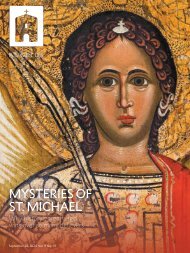Angelus News | August 2-9, 2019 | Vol. 4 No. 27
A nationwide trend pushing to remove tributes to certain historical figures of U.S. history has seized on a new, unlikely target: the bells lining California’s iconic El Camino Real. The reason? The belief that Spanish missionaries — among them St. Junípero Serra — were oppressors, captors, and even murderers of California’s first peoples. On Page 10, renowned historian Gregory Orfalea examines the most common critiques of the Spanish evangelization of California and makes the case for why the bells represent a legacy of love, not oppression.
A nationwide trend pushing to remove tributes to certain historical figures of U.S. history has seized on a new, unlikely target: the bells lining California’s iconic El Camino Real. The reason? The belief that Spanish missionaries — among them St. Junípero Serra — were oppressors, captors, and even murderers of California’s first peoples. On Page 10, renowned historian Gregory Orfalea examines the most common critiques of the Spanish evangelization of California and makes the case for why the bells represent a legacy of love, not oppression.
Create successful ePaper yourself
Turn your PDF publications into a flip-book with our unique Google optimized e-Paper software.
Restless for religious ed<br />
Sister Rosalia Meza takes over as director of the<br />
archdiocese’s new head of religious education<br />
Archbishop José H. Gomez and Sister Rosalia Meza.<br />
VICTOR ALEMÁN<br />
BY PABLO KAY / ANGELUS<br />
A few days after starting her new<br />
job, Sister Rosalia Meza’s office at<br />
the Archdiocesan Catholic Center<br />
overlooking Wilshire Boulevard in<br />
Koreatown got a fresh green paint job.<br />
A few paintings depicting scenes from<br />
the Gospels were placed on a wall<br />
opposite a framed photo of a statue of<br />
the Virgin Mary from the Spanish island<br />
of Mallorca, where her religious<br />
order was founded.<br />
Yet besides an empty bookcase, there<br />
isn’t much else in her fourth floor<br />
office. After all, she doesn’t plan to<br />
spend much time there.<br />
“Me, Rosalia, I don’t perceive myself<br />
just being in an office, I will kill myself!”<br />
she chuckled from behind her<br />
desk. “That’s not me, and that’s not<br />
my vocation.”<br />
But it is precisely her vocation that<br />
has led the 47-year-old Verbum Dei<br />
sister to LA’s ultimate Catholic office<br />
job: director of the Office of Religious<br />
Education (ORE) for the nation’s<br />
largest diocese, a post filled since 2015<br />
by Father Chris Bazyouros, who was<br />
appointed administrator of St. John<br />
Chrysostom Church in Inglewood<br />
this year.<br />
The department counts on 34 office<br />
employees but oversees religious<br />
education programs for the entire<br />
archdiocese, which this year saw more<br />
than 23,000 young people receive the<br />
sacrament of confirmation and nearly<br />
40,000 children receive first Communion.<br />
Rosalia Meza Moreno was<br />
born in Guadalajara, Mexico,<br />
to a Catholic family. She<br />
grew up living what she calls<br />
a “very normal life,” earning a degree<br />
in pedagogy at a Jesuit university and<br />
working as the supervisor of a software<br />
company’s education department,<br />
overseeing training personnel and<br />
procedures.<br />
“I had everything,” she recalled.<br />
“Everything was given to me.”<br />
The year was 1997. Meza’s boyfriend<br />
at the time wanted to get married. But<br />
something didn’t feel right.<br />
“I was searching for something more,<br />
and I didn’t know what.”<br />
Meza had plans to study for a Master’s<br />
degree in Canada. But a stay in<br />
20 • ANGELUS • <strong>August</strong> 2-9, <strong>2019</strong>


















